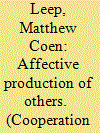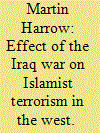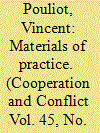|
|
|
Sort Order |
|
|
|
Items / Page
|
|
|
|
|
|
|
| Srl | Item |
| 1 |
ID:
099794


|
|
|
|
|
| Publication |
2010.
|
| Summary/Abstract |
IR scholars have recently turned to emotions to understand and explain events in world politics. Although this turn is appealing, most scholars have failed to critically examine the relationships between emotion, language, identity and foreign policy. This article aims to unpack these relationships. Drawing upon Sara Ahmed's notion of the 'emotionality of texts', this article explores how foreign policy may be an affective practice, which can be defined as a ritualized practice of discursively binding emotions to Others' identities and legitimating foreign policy through a discursive logic of feeling. In this way, identities are produced and policies are legitimated affectively. Neglecting the emotional narratives that constitute Self/Other relations leads to an insufficient understanding of emotion in global politics, an incomplete understanding of how identities emerge and matter as they do, and forecloses new alternatives of apprehending transformative ruptures and enduring patterns of Self/Other interaction. Through an analysis of United States policy towards the Israeli-Palestinian conflict, this article highlights the importance of emotion and affective practices in world politics.
|
|
|
|
|
|
|
|
|
|
|
|
|
|
|
|
| 2 |
ID:
099791


|
|
|
|
|
| Publication |
2010.
|
| Summary/Abstract |
This article investigates the effects of the Iraq war on terrorism in the West. Arguments from academics and from war-opponents and adherents are distilled into three hypotheses which are tested. To do this, a measure is created of terrorist activities in the West based on terrorist attacks and failed and foiled plots. The causal logic of the hypotheses is examined by piecing together data from various sources. Effects of the Iraq war are surprisingly hard to identify on terrorism in the West: It is difficult to corroborate that the Iraq war has drawn Islamist militant resources from the West, that Jihadist returnees should pose a significant threat, or that Muslims in greater numbers have been mobilized to terrorism. This does not disqualify transnational dynamics! Rather, it exemplifies how transnational dynamics in terrorism connects some parts of the globe, but not all, and not necessarily those most globalized. Immaterial factors, such as tactics from Iraq, have not been relevant in the West, but have had an effect in Afghanistan. Material factors like the return of Jihadists have not permeated to the West, but have had an effect in neighbouring countries.
|
|
|
|
|
|
|
|
|
|
|
|
|
|
|
|
| 3 |
ID:
099792


|
|
|
|
|
| Publication |
2010.
|
| Summary/Abstract |
In this article I argue that the Cartesian dualism informing dominant theories of International Relations (IR) has limited analytical purchase at the level of practice. The materials that enable and constrain contemporary diplomatic practices between NATO and Russia seamlessly combine natural, cultural and organizational artefacts: nuclear warheads take on a symbolic life of their own; linguistic formulations transform into 'things'; and committee meetings inscribe intersubjective dynamics with a new materiality. To materialist theories à la neo-realism, practice theory shows that material objects matter not because they have an immanent meaning, but rather because, in becoming part of social relations, they acquire a form of agency of their own, making people do things they would not have done otherwise. To IR constructivism, this article demonstrates that it is not only people who attach meanings to things; things also attach meanings to people. Enmeshed in social relations, material objects often acquire an epistemic life of their own that may affect, in turn, the very people who constructed them.
|
|
|
|
|
|
|
|
|
|
|
|
|
|
|
|
| 4 |
ID:
099793


|
|
|
|
|
| Publication |
2010.
|
| Summary/Abstract |
The remarkable increase in European security and defence integration in the past decade has presented a challenge to traditional integration theories. Although they remain relevant, these theories fail to take full account of the changing security architecture of Europe, which includes the rise of transgovernmental networks (TGNs). With a focus on EU civil protection, this article critically examines established definitions of TGNs and investigates how these networks influence the supranational and national levels of security cooperation. Findings point toward the emergence of an alternative form of European security governance that addresses the lack of authority in EU security policy.
|
|
|
|
|
|
|
|
|
|
|
|
|
|
|
|
| 5 |
ID:
099790


|
|
|
|
|
| Publication |
2010.
|
| Summary/Abstract |
Since the early 1990s, the European Union (EU) has presented itself as a leader on climate change. Recently, however, this picture has been challenged in the media and by non-governmental organization representatives. The aim of our article is to evaluate the Union's present role in the area of international climate politics. We do this by scrutinizing the EU's own role conception, but also, and primarily, by investigating the perceptions and expectations of government representatives from outside the Union itself. Our results - reflecting external perceptions of the EU after COP 14 (Conference of the Parties) in December 2008 - demonstrate that the EU is indeed still seen as a green leader. Officials from both developing states and major powers share the view of the Union as a largely coherent and credible leader, though some observers question the correspondence between what the EU says and what it does. The EU is mainly perceived to lead by example by being a role model for other state actors. We discuss how these results fare in the light of the COP 15 Copenhagen meeting in December 2009.
|
|
|
|
|
|
|
|
|
|
|
|
|
|
|
|
|
|
|
|
|